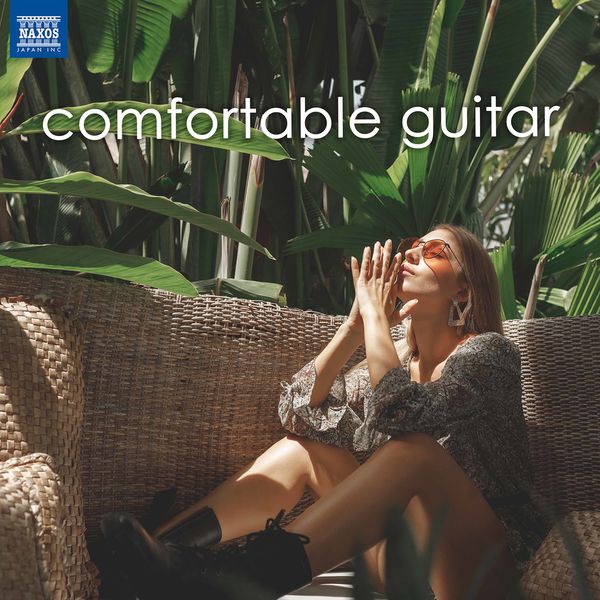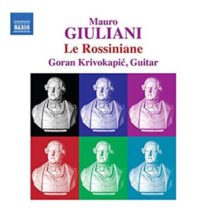
MAURO GIULIANI
In a sense, this is a difficult review to write. How can I avoid repetitions of superlatives or constant reference to a thesaurus? So let’s do this: think of anything you could use to describe a performance – musicianship, musicality, technical brilliance – the list could go on. Now believe me when I tell you the Goran Krivokapić’s rendition of the six Giuliani Rossiniane is at the very highest level in anything you can imagine. This is superlative playing of such power and imagination that it elevates the works far above what can descend to mere pastiches. This is some of the finest playing I have ever heard, and the best recording of Giuliani’s music since Pepe Romero’s discs of solos and concerted works decades ago. Graham Wade’s exemplary notes include references to all of the Rossini operas which are quoted in the pieces. The recording exemplifies Norbert Kraft’s work in its customary excellence.
Al Kunze, Soundboard
July 2021
In a sense, this is a difficult review to write. How can I avoid repetitions of superlatives or constant reference to a thesaurus? So let’s do this: think of anything you could use to describe a performance – musicianship, musicality, technical brilliance – the list could go on. Now believe me when I tell you the Goran Krivokapić’s rendition of the six Giuliani Rossiniane is at the very highest level in anything you can imagine. This is superlative playing of such power and imagination that it elevates the works far above what can descend to mere pastiches. This is some of the finest playing I have ever heard, and the best recording of Giuliani’s music since Pepe Romero’s discs of solos and concerted works decades ago. Graham Wade’s exemplary notes include references to all of the Rossini operas which are quoted in the pieces. The recording exemplifies Norbert Kraft’s work in its customary excellence.
Al Kunze, Soundboard
July 2021
When Mauro Giuliani returned home after his triumphant Viennese period, in 1819, he found a much less receptive environment than the one he had left. It is well known that in Italy interest in instrumental music was marginal, with the focus on operatic music. It is significant that a few weeks after his hasty departure from the Hapsburg capital, Giuliani complained that in Verona “the poor paganino did not even pay his expenses, indeed he had to pay out of his own pocket”. In addition, the virtuoso from Bisceglie fell back into a context in which the guitar was always considered “the ungrateful instrument”, despite the paradoxical fact that Italian guitarists, from Carulli to Molino to the young Legnani, were acclaimed in European capitals in those very years! If in Italy, in spite of his efforts, Giuliani did not succeed in making a concrete impression, continuing to dream of a comeback in the Austrian capital practically until his death in Naples in 1829, from a purely artistic point of view he was nevertheless victorious thanks to his genius. In fact, he was able to transform the weaknesses of that situation into a compositional solution that could leverage the Italian passion for opera and Rossini, support the local unaccustomedness to the great instrumental forms, and bring into play a virtuosity of such brilliance that certainly could not leave anyone indifferent: that new genre of Fantasia or Pot-Pourri to which he gave life with the Six Rossiniana (op. 119-124), probably conceived in substance around 1820/1821, but actually composed and published at different times and with different publishers (who adopted marginally different titles, however), and which was a success. Moreover, even if the period was full of operatic fantasies, in the field of the guitar it was perhaps never again achieved the poignancy, fluidity and iconicity with which these vast frescoes intertwine introductions, Rossinian themes, variations, linking episodes and sparkling endings: showing such an interpenetration of Rossini’s idiom that it is hard to distinguish the “authentic” passages from those due entirely to Giuliani, such as the long section, full of repeated crescendos, which in Rossiniana no. 3 which leads from the Quintet of the second act of Turco in Italia to the Introduction to the first act of Zelmira. It is indeed emblematic that in the score of the sixth and last Rossiniana (the ways in which the original themes are declared or not vary greatly from one opera to another, including some “pitfalls”) the various episodes are explicitly attributed to “Giuliani” and “Rossini”, as if to establish an equal dignity between the two composers. Two hundred years after their composition, with their transcendental virtuosity, the Rossiniane continue to represent a serious challenge for the interpreter, who in addition to having the necessary technical fluency must also possess the same stylistic competence and a certain “theatrical” sense of phrasing, necessary to captivate the listener and transport him into the magical world of Pesaro. These are all qualities which are largely in the possession of the Montenegrin Goran Krivokapic´, who, having reached maturity (he is now forty-two years old), continues to arouse the admiration he aroused at the beginning of the two thousand years, a time when he won numerous victories in the great international competitions. The themes are invariably presented with plasticity and character, thanks to the sensitivity for cantabile, to the richness of colours and modes of sound attack, capable of the most diverse instrumental evocations; the vocal cadences (see op. 122) are very idiomatic; the phrasing is electrifying but also flexible, expressive and respectful of the prescribed dynamics (also in Rossiniana n. 3, whose score presents a real display of contrasts). The guitarist allows himself some liberty only in the gradual crescendo of “Questo e’ un nodo avviluppato” in the beautiful Quinta Rossiniana, where Krivokapic´ adopts a freer and more elastic progression than indicated, but to tell the truth with a valuable expressive effect; basically applying the tempo rubato of vocal matrix to a passage of exquisitely instrumental nature. Finally, thanks to the record length squeezed to the support (without prejudice to quality) by Naxos technicians, this is to my knowledge the first recording that manages to contain all the Rossiniane in a single CD.
Roberto Brusotti, Musica
July/August 2021
The Giuliani Renaissance in the guitar world began in the 1970s. There were two main proponents of this fundamental turning point in the knowledge of the nineteenth-century guitar repertoire: Thomas Heck with his now historic 1970 thesis at Yale University (The Birth of the Classic Guitar…) and Ruggero Chiesa who began a series of publications with the most representative works of the Apulian maestro. The rest is well known, with the publication in the eighties of the complete Tecla Editions by Brian Jeffery which definitively sanctioned Giuliani’s complete rehabilitation. The record market, albeit with some delay, adapted to the new important acquisitions and recordings of the most important pieces began to appear. Among these, the story of the six Rossiniane is quite particular and, in some ways, follows that of the Grand Concerto op. 30. Like the latter, in fact, the six splendid potpourri became famous thanks to a completely reworked recording version: it was the one by Julian Bream on an LP of 1974 later remastered on CD in the Julian Bream Edition (Popular Classics for Spanish Guitar, RCA Victor Gold Seal, vol. 8, 1993). We still remember that in our youth we were fascinated by the performance of the great Julian, but the purchase of the score published by Chiesa revealed to us not without amazement how things really were… The Rossiniane, quite rightly, began to become more and more popular in concert halls – the first one in particular – until Frédéric Zigante made the first complete recording on a double CD (ARTS, 1994). This was the beginning of a series of numerous other recordings – integral or otherwise – by a wide variety of performers. As always happens in these cases, the results obtained are very different but, fortunately, there is no lack of examples where the artistic value is of a remarkable level and, sometimes, it is not easy to define which is the best recording. Without wishing to draw up annoying – and useless – classifications, we must confess that we were very impressed by this splendid recording by the Montenegrin guitarist Goran Krivokapić. Incidentally, all six Rossiniane are contained on one CD (other complete works always include two), the total length of which is almost eighty-nine minutes, which is well beyond the maximum capacity of a normal CD. An audio technician explained to us that this has been made possible by a particular recording technique, a technique which, however, precludes the reading on older CD players.
But back to our Rossinians. Krivokapić gives a truly enthralling performance and, excuse the obvious tautology, as Rossinian as it gets. Let us explain. Apart from the decidedly spectacular technique, the Montenegrin guitarist succeeds perfectly in tracing and reproducing the psychological and musical mechanism inherent in the formal structure of the Rossiniane. Giuliani, in fact, does not limit himself to simply and slavishly transcribing Rossini’s melodies: in the microstructure he reconstructs the individual expressive stylistic elements (the recitative, the punto coronato, the arioso, the chorus, the orchestral mottling, etc.), in the macrostructure he arranges his Finale (the closing element of Rossini’s work) exactly as Rossini did in the Finale d’Atto of his opera, i.e. with the duration of a third of the entire formal structure and with the function of resolving all the tensions accumulated during the performance (in Rossini the psychological dynamics of characters and situations, in Giuliani the continuous slippage of the final harmonic resolutions). And the full resolution is – and must be – as energetic, sweeping and pyrotechnical as ever. This is how Goran Krivokapić behaves admirably, and his ‘Act Finals’ are explosive and exciting. Listen, for example, to Rossini’s No. 1, with its famous and spectacular octave passage, to No. 2 with its virtuosic scales and burning arpeggios, and to No. 3 with its cascade of chords, arpeggios and swirling rebounds. The individual expressive stylistic elements mentioned above are realised by Krivokapić with great skill and icasticity: thus the masterly chorus of “Non più mesta accanto al fuoco” (Cinderella, Rossiniana n. 2) and “Questo nome suona vittoria” (L’Assedio di Corinto, n. 6); the triumphant march of “Ah, quel suon già d’Israele” (Mosè in Egitto, no. 4); the dramatic dry recitative of “Assisa a piè d’un salice” (Otello, no. 1) and accompanied in the Introduction of no. 2; the virtuosic bel canto coloraturas of “Deh! Calma, o ciel” (Otello, no. 2) and of the celebrated “Una voce poco fa” (Il Barbiere Sivere, Rossiniana no. 2); the virtuoso coloraturas of “Deh! (Il Barbiere di Siviglia, no. 3); the whirling, alienating nonsense of “Pensa alla patria” (L’Italiana in Algeri, no. 1) and, above all, “Questo è un nodo avviluppato” (La Cenerentola, no. 5). There are countless points worthy of mention for the extraordinary instrumental performance and coherence with the original text, but we would like to mention at least one. This is one of those moments in which Rossini, unlike Verdi for example, shows his well-known indifference towards the text of the librettos to be set to music (as they say, with his extraordinary melodic vein he could have set to music even the shopping list): from a literary point of view the prosody of the verse “Sorte secondami” (Zelmira, in Rossiniana n. From a literary point of view, the prosody of the verse “Sorte secondami” (Zelmira, in Rossiniana n. 2) is clearly defined by the fact that the second word is slippery (se-còn-da-mi), while in music the musical accent transforms it into flat (se-còn-da-mi), thus creating many problems for the singers. Giuliani brilliantly resolves the issue by shifting the emphasis to the upbeat and Krivokapić further emphasises this by adding a slur.
In conclusion, one cannot help but underline how the display of such a solid and virtuosic technique never degenerates into heaviness and vulgarity – a risk always present when speed and energy reach transcendental levels – but, on the contrary, always manages to remain sparkling and glittering: Rossini, indeed. Truly a beautiful record, worth listening to.
Marco Riboni, Il Fronimo
July 2021
Mauro Giulani was a gifted guitarist of the early nineteenth century and composed a large range of works for the instrument. These six Rossiniana skilfully draw on melodies from Rossini’s operas as the basis for the individual movements. However these are not simple improvisations in the way that Liszt approaches Rossini or Bellini. Giulani takes a number of themes in each movement so that the outcome is a new work rather than a variant on the original. Highly effective and splendidly played here by Goran Krivokapic.
© 2020 Lark Reviews
Mauro Giuliani was both a virtuoso performer on the guitar and one of the great figures in early 19th-century composition for the instrument. His works have entered the repertoires of generations of subsequent performers. The six dazzling Rossiniane for solo guitar are fantasies on themes taken from the great Italian composer’s operas. They offer a compendium of the guitar as a miniature orchestra, revealing refinements of technique and expressiveness never before achieved on the instrument. Goran Krivokapić is one of the leading guitarists and chamber musicians of today.
© 2020 WFMT (Chicago)
Mauro Giuliani was born in Italy in 1781, but it was his move to Vienna in 1806 where he was established as the world’s greatest guitarist and a highly prolific composer. Into his life came another Italian, the opera composer, Gioachino Antonio Rossini, whose music was to offer him a wealth of melodies to stimulate this fertile composer, and there followed many compositions that have already featured on Naxos releases. Now we have his most extensive group with the six works called Rossiniana composed in the 1820s. They used Rossini’s most popular operatic arias in an extravaganza of guitar virtuosity, each one using several arias, though where arias began and ended was not always clear in the excesses of Giuliani’s inventiveness. Strangely, after his death in 1829, Giuliani’s mass of works – they were almost all for guitar – fell from the concert repertoire, their virtuosity only he singularly possessed. It was to be the British guitarist, Julian Bream, who discovered the extent of his output, and after almost 140 years, they were again performed and published. Here we have the Serbian guitarist, Goran Krivokapic, one of today’s great virtuosos, who will excite the listener in those fast passages where he is superb. Few recording teams could bring to you his technical brilliance and wide dynamic range with clarity of Naxos’s Canadian team. To keep all six works together, Naxos offers a CD playing for almost 89 minutes. The disc that no guitarist can be without.
© 2020 David’s Review Corner
Montenegrin guitarist Goran Krivokapic is a brilliant interpreter of this music. These works are potpourris, medleys of themes from several different operas that were well known in their day but perhaps less now. Being an excellent guitarist and a musician who could recognize a good tune when he heard it, Giuliani knew how to arrange melodies and harmonies and even added a few of his own variations into the music.
This is the first recording I know of that includes all 6 Rossinianes, Opp. 119-124; the first five were published in 1820-23, and the last in 1827. For fans of Giuliani and Rossini, this is one for your collection. © 2021 American Record Guide Read complete review on American Record Guide
Jim McCutcheon – American Record Guide, September 2021
This disc deserves to be on the shelves of all who love the classical guitar.
Born in Belgrade, guitarist Goran Krivokapić now lives in Cologne, where he is Professor of Guitar at the city’s Hochschule für Musik. As his earlier recordings have shown, he has a virtuoso’s technique as a guitarist. He brings to these pieces, among the supreme works in the solo guitar repertoire, an absolute technical mastery, excellent judgement of dynamics and a vivid musical imagination. © 2021 MusicWeb International
Glyn Pursglove – © 2021 MusicWeb International, February 2021
“One of the most sought-after guitarists of today.”
Medici TV
- CD
- 17.99
- (Shipping and Handling Included)
Mauro Giuliani
Le Rossiniane Op. 119 – 124
1. Rossiniana No. 1, Op. 119
2. Rossiniana No. 2, Op. 120
3. Rossiniana No. 3, Op. 121
4. Rossiniana No. 4, Op. 122
5. Rossiniana No. 5, Op. 123
6. Rossiniana No. 6, Op. 124

J. S. BACH
Critics’ Choice Top 10
Naxos
“There is a convincing French-styled swing of rhythms in the allemandes and courantes. Harpsichordists and pianists could envy the level of involvement on display here.”
– American Record Guide
“The second volume in the Montenegrin Guitar Duo’s complete English Suites is every bit as good as the first, with Goran Krivokapic´ and Danijel Cerovic´ divvying up the left and right-hand keyboard parts of the Suites Nos 4-6 while allowing for frequent swapping of parts. The precision of ensemble, the clarity of articulation, the rhythmic vitality and the exuberant ornamentation recall the Bach-playing of Presti and Lagoya and the Assad Brothers, while adopting a more subtle approach to those changes in timbre and colours so idiomatic to the classical guitar.”
-Willian Yeoman, Gramophone
“… you’ ll find the performances technically assured, interpretively nuanced yet free of mannerism, and very carefully, expertly balanced across registers and between voices. In other words, these are very fine realizations that lovers of Bach and the guitar will appreciate.”
– ClassicsToday.com
“These are fine transcriptions, brilliantly played. The faster movements are played with infectious rhythmic energy and joy. Ornaments sparkle like firecrackers, and some of the slower movements are simply ravishing—listen to the sarabande from the second suite and be awashed in beauty!”
– American Record Guide
“The collaboration of guitar and piano is rare and unexpected. The CD opens with Castelnuovo-Tedesco’s Op. 145 Fantasia for guitar and piano. The first movement’s dreamlike sequences are well managed by neat work on the tone of the instruments. The way the piano and guitar flow in and out of each other is remarkable. The second movement is true to the spirit of the composer and played with rhythmic accuracy and enjoyable lightness. Anton Diabelli ‘s Op. 102 Grande Sonate Brillante is another challenging piece. The couple are very well at their togetherness and phrases begin and end with a purpose. The lyrical moments are treated with subtle colours. Dusan Bogdanovic’s Sonate Printaniere is a contemporary work, but quite classical and lyrical in its approach. The South African composer Hendrik Hofmeyr’s rhapsody closes the CD. This is a work dedicated to the couple and in this world premiere recording, the capacities and collaboration possibilities of the instruments are tested to the end. The musicians maintain a good rapport even in passages where they have totally different content to express and the results are impressive. Recommended.”
– Andante Magazine, Turkey
“Dynamic levels are nicely varied throughout, as are textures, … the Sarabande in the Second Suite is beautifully grave and dignified. Articulation is very clean and clear, and the clarity is enhanced by a modest (i.e., not “ping-pong”-like) separation of the two performers across the stereo sound
stage.”
– Fanfare
“Danijel Cerović and Goran Krivokapić have brilliantly taken the challenge of this ambitious project with quality arrangements, in which the guitars are harmoniously conversing. The original aspect of the keyboard pieces remains when listening, while honoring a way of playing specific to the guitar. The performance is flawless and accurate… This CD is then a must-have, and next volume is eagerly awaited.”
– Guitare Classique
“…both men play extremely well, and are quite naturally captured within the sonic picture.”
– Classical Net
“Though Bach spent his life within a remarkably limited geographical area, his knowledge of various contemporary baroque styles was indeed expansive. In arrangements of three of his six English Suites, originally written for keyboard, the Montenegrin Guitar Duo translates Bach’s mastery of encompassing several musical styles within a single work through a new, refreshing instrumental texture.”
– WGBH
“The scintillating performances by Krivokapić and Cerović capture the living spirit of Bach’s dance-inflected music without any fussiness, so that they seem as vital today as when Bach first wrote them.”
– Audio Video Club of Atlanta
“Bach has always come in many shapes and sizes, and now we have the first three English Suites —the others are scheduled to follow— in guitar duo arrangements. It is the work of the performers on this highly attractive release who remain true to the spirit of the original keyboard score, with much of the writing to remain untouched, while the textures created come close to that of a harpsichord. The work’s title is misleading, as these are French influenced scores imbued with the stately dance of the 18th century, its name arising, in all probability, from the visit of an English man who received the score from Bach. It is not overly difficult music to perform on the keyboard, though the fast movements, such the Prelude to the Second and Third Suites, will test virtuoso guitarists as notes whizz past at a mercurial speed. Indeed the performances as a whole buzz with vivacity, and though there is a sense of interplay between instruments, the integration of the Montenegrins is so perfect you often have the feeling that just one performer is involved. Individually they have been multi-award winners, their coming together having inspired many contemporary works to be written for them. To place their immaculate performances on disc, they travelled to Canada to work with the world’s top guitar recording team.The result is an essential purchase for guitar buffs, and equally for those wishing to enjoy refreshingly new Bach perspectives.”
– David’s Review Corner
- (arr. Montenegrin Guitar Duo for 2 guitars)
- CD
- 17.99
- (Shipping and Handling Included)
J. S. Bach
English Suites Nos. 1-3
English Suite No. 1
in A Major, BWV 806
1. I. Prelude
2. II. Allemande
3. III. Courante I
4. IV. Courante II
5. IV. Double I
6. IV. Double II
7. V. Sarabande
8. VI. Bourree I –
VII. Bourree II
9. VIII. Gigue
English Suite No. 2
in A Minor, BWV 807
10. I. Prelude
11. II. Allemande
12. III. Courante
13. IV. Sarabande
14. V. Bourree I – II
15. VI. Gigue
English Suite No. 3
in G Minor, BWV 808
16. I. Prelude
17. II. Allemande
18. III. Courante
19. IV. Sarabande
20. V. Gavotte I – II
21. VI. Gigue
* All pieces arranged and recorded by Danijel Cerovic and Goran Krivokapic (Montenegrin Guitar Duo).

J. S. BACH
Critics’ Choice Top 10
Naxos
“It is a great idea, carried off to perfection in this superb disc. To put it another way, this is brilliant musicianship and playing of some of Bach’s most enjoyable suites of dances.”
– Soundboard Magazine
“… you’ ll find the performances technically assured, interpretively nuanced yet free of mannerism, and very carefully, expertly balanced across registers and between voices. In other words, these are very fine realizations that lovers of Bach and the guitar will appreciate.”
– ClassicsToday.com
“These are fine transcriptions, brilliantly played. The faster movements are played with infectious rhythmic energy and joy. Ornaments sparkle like firecrackers, and some of the slower movements are simply ravishing—listen to the sarabande from the second suite and be awashed in beauty!”
– American Record Guide
“Dynamic levels are nicely varied throughout, as are textures, … the Sarabande in the Second Suite is beautifully grave and dignified. Articulation is very clean and clear, and the clarity is enhanced by a modest (i.e., not “ping-pong”-like) separation of the two performers across the stereo sound
stage.”
– Fanfare
“Danijel Cerović and Goran Krivokapić have brilliantly taken the challenge of this ambitious project with quality arrangements, in which the guitars are harmoniously conversing. The original aspect of the keyboard pieces remains when listening, while honoring a way of playing specific to the guitar. The performance is flawless and accurate… This CD is then a must-have, and next volume is eagerly awaited.”
– Guitare Classique
“…both men play extremely well, and are quite naturally captured within the sonic picture.”
– Classical Net
“Though Bach spent his life within a remarkably limited geographical area, his knowledge of various contemporary baroque styles was indeed expansive. In arrangements of three of his six English Suites, originally written for keyboard, the Montenegrin Guitar Duo translates Bach’s mastery of encompassing several musical styles within a single work through a new, refreshing instrumental texture.”
– WGBH
“The scintillating performances by Krivokapić and Cerović capture the living spirit of Bach’s dance-inflected music without any fussiness, so that they seem as vital today as when Bach first wrote them.”
– Audio Video Club of Atlanta
“Bach has always come in many shapes and sizes, and now we have the first three English Suites —the others are scheduled to follow— in guitar duo arrangements. It is the work of the performers on this highly attractive release who remain true to the spirit of the original keyboard score, with much of the writing to remain untouched, while the textures created come close to that of a harpsichord. The work’s title is misleading, as these are French influenced scores imbued with the stately dance of the 18th century, its name arising, in all probability, from the visit of an English man who received the score from Bach. It is not overly difficult music to perform on the keyboard, though the fast movements, such the Prelude to the Second and Third Suites, will test virtuoso guitarists as notes whizz past at a mercurial speed. Indeed the performances as a whole buzz with vivacity, and though there is a sense of interplay between instruments, the integration of the Montenegrins is so perfect you often have the feeling that just one performer is involved. Individually they have been multi-award winners, their coming together having inspired many contemporary works to be written for them. To place their immaculate performances on disc, they travelled to Canada to work with the world’s top guitar recording team.The result is an essential purchase for guitar buffs, and equally for those wishing to enjoy refreshingly new Bach perspectives.”
– David’s Review Corner
- (arr. Montenegrin Guitar Duo for 2 guitars)
- CD
- 17.99
- (Shipping and Handling Included)
J. S. Bach
English Suites Nos. 1-3
English Suite No. 1
in A Major, BWV 806
1. I. Prelude
2. II. Allemande
3. III. Courante I
4. IV. Courante II
5. IV. Double I
6. IV. Double II
7. V. Sarabande
8. VI. Bourree I –
VII. Bourree II
9. VIII. Gigue
English Suite No. 2
in A Minor, BWV 807
10. I. Prelude
11. II. Allemande
12. III. Courante
13. IV. Sarabande
14. V. Bourree I – II
15. VI. Gigue
English Suite No. 3
in G Minor, BWV 808
16. I. Prelude
17. II. Allemande
18. III. Courante
19. IV. Sarabande
20. V. Gavotte I – II
21. VI. Gigue
* All pieces arranged and recorded by Danijel Cerovic and Goran Krivokapic (Montenegrin Guitar Duo).
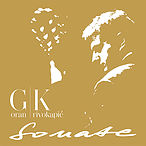
SONATE
“[…] This sonata by Haydn […] is presented by Krivokapic with a precision and a passion for detail, equal to that of an Andras Schiff ..”
– Il Fronimo
“Krivokapic devotes himself to Bach equipped with a perfect technique, an indispensable precondition necessary for the phrasing and articulation of late Baroque music in order to preserve its authentic vitality. His ornamentation resembles that of an experienced harpsichordist, the sound is beautiful, free and open.”
– Il Fronimo
“The “Finale” [José Sonata] is a display of fireworks and worthy of Goran Krivokapic’s skill. A beautiful interpretation of José and all in all a beautiful recording.”
– Il Fronimo
- CD
- 17.99
- (Shipping and Handling Included)
C.P.E. Bach
Sonata in A-minor
1. Poco Adagio
2. Allegro
3. Allegro
J. Haydn
Sonata in D. HOB XVI:33 (No 34)
4. Allegro
5. Adagio
6. Tempo di Menuet
A. Jose
Sonata para guitarra
7. Allegro Moderato
8. Minueto
9. Pavana Triste
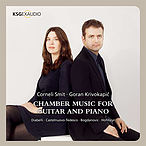
CHAMBER MUSIC FOR GUITAR AND PIANO
CD of the Week
Fine Music Radio, South Africa
“When two true virtuosos such as the fantastic guitarist Goran Krivokapic and the equally brilliant pianist Corneli Smit conspire and enter this fallow field together, the expert is all ears. Smit and Krivokapić are certainly the right ones to make this genre popular again. This excellent CD provides the evidence.”
– Akustik Gitarre magazine, Germany
“This unity goes beyond mere duo playing.”
– Die Beeld newspaper, South Africa
“The four compositions these two artists have recorded make the audience feel that this unusual combination of guitar and piano does work – owing to the fact that both musicians are outstanding. Continuous intensity and enthusiasm radiates throughout.”
– Die Burger newspaper, South Africa
“The collaboration of guitar and piano is rare and unexpected. The CD opens with Castelnuovo-Tedesco’s Op. 145 Fantasia for guitar and piano. The first movement’s dreamlike sequences are well managed by neat work on the tone of the instruments. The way the piano and guitar flow in and out of each other is remarkable. The second movement is true to the spirit of the composer and played with rhythmic accuracy and enjoyable lightness. Anton Diabelli ‘s Op. 102 Grande Sonate Brillante is another challenging piece. The couple are very well at their togetherness and phrases begin and end with a purpose. The lyrical moments are treated with subtle colours. Dusan Bogdanovic’s Sonate Printaniere is a contemporary work, but quite classical and lyrical in its approach. The South African composer Hendrik Hofmeyr’s rhapsody closes the CD. This is a work dedicated to the couple and in this world premiere recording, the capacities and collaboration possibilities of the instruments are tested to the end. The musicians maintain a good rapport even in passages where they have totally different content to express and the results are impressive. Recommended.”
– Andante Magazine, Turkey
“[…] From the beginning, showing an excellent tonal blend between the piano and the pure and full-bodied sound of Krivokapić throughout.”
– IL Fronimo journal, Italy
“Duo Smit-Krivokapic emerges full of praise from this discographical encounter and will most certainly be appreciated in the not so crowded field of chamber music with guitar, mainly as a result of an exceptional technical soundness.”
– IL Fronimo journal, Italy
- CD
- 17.99
- (Shipping and Handling Included)
Anton Diabelli
Grande Sonata Brillante, Op. 102
1. Adagio – Allegro
2. Adagio (ma non tanto)
3. Allegro – Trio
Mario Castelnuovo-Tedesco
Fantasia for guitar and piano Op. 145
4. Andantino (quiet and dreamy)
5. Vivacissimo (leggero e volante)
Dusan Bogdanovic
Sonate Printanière for guitar and piano*
6. Rubato lirico
7. Adagio lirico
8. Con umore
9. Allegro brillante
Hendrik Hofmeyr
10. Rapsodia Notturna per Chitarra e Pianoforte*
*World première recording
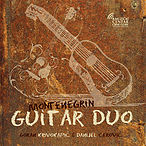
MONTENEGRIN GUITAR DUO
“The Krivokapić and Cerović guitar duo (Montenegrin Guitar Duo) is an exceptional guitar ensemble. These outstanding artists play my Sonata Fantasia with a deep understanding of the text and have impeccably captured the spirit of my music with a great sense of drama and temperament. I am sure other composers would be thrilled and honored to have such a brilliant representation of their work. Bravo!”
– Dušan Bogdanović – composer
“As a composer I have had some possibilities to collaborate with the Montenegrin Guitar Duo. Goran Krivokapić and Danijel Cerović are first class musicians. In my opinion their duo is now one of the best of the world scene today.”
– Gerard Drozd – composer
- CD
- 17.99
- (Shipping and Handling Included)
Ástor Piazzolla
Tango Suite
1. Deciso (Tango No. 1)
2. Andante (Tango No. 2)
3. Allegro (Tango No. 3)
Carlo Domeniconi
Circus Music Op. 54a for two guitars
4. The Argentine Knife Thrower
5. Spanish Riders on Greek Horses
6. The Wax Museum
7. The Duck Race
8. Plik, the Flea of the Andes
9. The Ural Magic Voice and the Don Cossaks
10. The Fire Brigade “On Ice”
11. The Yogi who Dissappears through the Key Hole
12. The Orchestra Says Good-Bye
Dusan Bogdanovic
Sonata Fantasia for two guitars
13. Allegro ritmico
14. Adagio rubato
15. Allegro molto
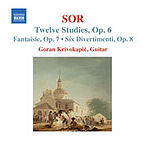
SOR
Guitar’s TOP 100
by Enrique Robichaud
“This recording […] can compete with any Sor disc on the market, with technically unimpeachable playing and a program that perhaps resembles one Sor himself might have chosen.”
– Allmusic.com
“This recording by Montenegro’s Goran Krivokapic, one of a group of players from the Balkans who have made convincing recordings of Spanish repertoire, can compete with any Sor disc on the market, with technically unimpeachable playing and a program that perhaps resembles one Sor himself might have chosen. The engineering from Naxos…is fine here, with a simple clarity that complements Krivokapic’s straightforward style and none of the fetishization of performer noise so common in guitar recordings. Recommended for guitar enthusiasts or just as an introduction to Sor, for most of the pieces here are staples of guitar recitals.”
– Allmusic.com
“Sor comes alive in the hands of Goran Krivokapić.
Wonderful collection of Fernando Sor pieces and beautifully played by performer Goran Krivokapic. The recording is very well done and the music tranquil.
Goran Krivokapic’s playing is clever and lively, rendering Sor as good as Sor gets.
The Naxos recording is crystal clear – not too close or distant; perfect ambiance.”
– Amazon customer reviews
- CD
- 14.99
- (Shipping and Handling Included)
Sor
1. Etudes, Op. 6: no 1 in D major, Moderato
2. Etudes, Op. 6: no 2 in A major, Andante allegro
3. Etudes, Op. 6: no 3 in E major
4. Etudes, Op. 6: no 4, Allegretto
5. Etudes, Op. 6: no 5 in B minor, Andante
6. Etudes, Op. 6: no 6 in A major, Andante allegro
7. Etudes, Op. 6: no 7, Allegro
8. Etudes, Op. 6: no 8 in C major, Andantino
9. Etudes, Op. 6: no 9 in A minor, Andante allegro
10. Etudes, Op. 6: no 10 in A major, Moderato
11. Etudes, Op. 6: no 11 in E minor, Allegro moderato
12. Etudes, Op. 6: no 12 in A major, Andante
13. Fantasia for Guitar in C minor, Op. 7: Largo
14. Fantasia for Guitar in C minor, Op. 7: Theme and Variations
15. Divertimentos, Op. 8: no 1, Minuet
16. Divertimentos, Op. 8: no 2, Waltz
17. Divertimentos, Op. 8: no 3, Andantino
18. Divertimentos, Op. 8: no 4, Allegretto scherzoso
19. Divertimentos, Op. 8: no 5, March
20. Divertimentos, Op. 8: no 6, Waltz
21. Variations for Guitar on a theme from Mozart’s ‘Magic Flute’, Op. 9
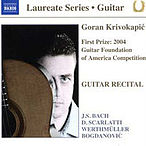
GUITAR RECITAL
Golden Guitar Award
for best cd of the year 2005
“If you can listen without at least wanting to move to the beat, you probably don’t have the volume right. Technique throughout is superb. The artist knows his music!”
– Aeroknow.com
“He is a real discovery that you should hear.”
– NAXOS.com
“Overall this is a disc in a hundred.”
– Barnes & Noble
“My expectations were high when I pressed the “play”-button; I was not disappointed. Rarely have I heard such remarkable fluency and lightness. Rarely have I heard a guitar “sing” with such sonority.”
– musicweb-international.com
“Goran Krivokapić offers us a beautiful disc, with such variety of repertoire, which enables him to show a broad range of his talent in his clear and limpid play, without becoming stereotype.”
– ResMusica.com
- CD
- 14.99
- (Shipping and Handling Included)
Franz Werthmuller
Piano Sonata in A major, Op. 17 (arr. F. Pfeifer)
1. I. Allegro
2. II. Lento
3. III. Rondo Vivace
J. S. Bach
Violin Sonata No. 3 in C major, BWV 1005
(trans. G. Krivokapic)
4. I. Adagio
5. II. Fuge
6. III. Largo
7. IV. Allegro assai
Domenico Scarlatti
8. Keyboard Sonata in E major, K. 162/L.21/P.162
9. Keyboard Sonata in A major, K. 208/L.238/P.315
10. Keyboard Sonata in A major, K. 209/L.428/P.209
Dusan Bogdanovic
Guitar Sonata No. 2
11. I. Allegro deciso e appassionato
12. II. Adagio molto espressivo
13. III. Scherzo malinconico
14. IV. Allegro ritmico
Appears on

I maestri della chitara – Angelo Gilardino
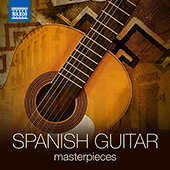
SPANISH GUITAR MASTERPIECES
“There is a goodly helping of music by Isaac Albéniz, Francisco Tárrega and Gaspar Sanz, with a fleeting visit from Joaquín Rodrigo and Manuel de Falla, the seventeen tracks taken from Naxos’s enormous catalogue of guitar discs. An abundance of atmospheric Spanish strumming, with many famous melodies to form that pleasing backdrop, the disc featuring a long list of performers including famous names, such as Norbert Kraft, and major guitar competition winners over many years.”
– David’s Review Corner
- CD
- 14.99
- (Shipping and Handling Included)
C.P.E. Bach
Sonata in A-minor
1. Poco Adagio
2. Allegro
3. Allegro
J. Haydn
Sonata in D. HOB XVI:33 (No 34)
4. Allegro
5. Adagio
6. Tempo di Menuet
A. Jose
Sonata para guitarra
7. Allegro Moderato
8. Minueto
9. Pavana Triste
